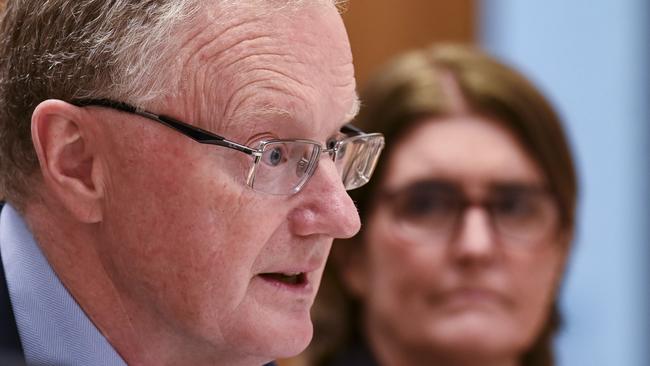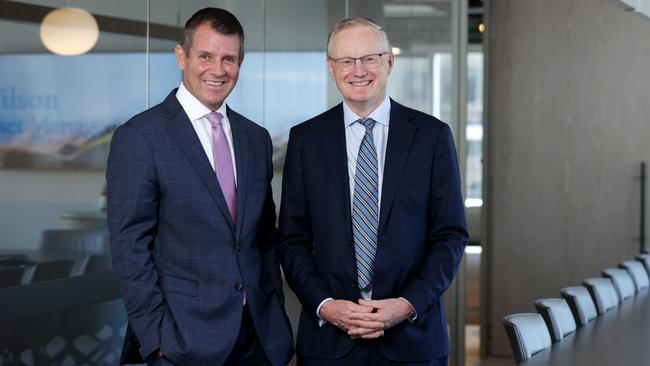Former RBA governor Philip Lowe warns on interest rates after scoring new gig with Future Generation Australia
Philip Lowe says ‘fixing housing’ needs to be a priority and warns on interest rates as he takes on the first role since stepping down from the RBA board last year.

Former Reserve Bank governor Philip Lowe has warned there is still capacity for interest rates to rise here rather than fall, after the boss of US banking giant JPMorgan advised against the US Central bank cutting rates.
“We’ve got to make sure that inflation is actually sustainably back to target,” said Dr Lowe. “Let’s hope we will get there soon, but we are not there yet.”
Annual consumer price inflation is currently at 4.1 per cent, above the RBA’s target range of between 2-3 per cent. Despite many economists predicting a cut this year, the central bank has not ruled out a further increase, after raising its cash rate 13 times between May 2022 and November 2023 to a 12-year high of 4.35 per cent.
“There is two-way risk,” said Dr Lowe. “Things can often turn out different to what you expect, so the bank was right to remind us that there is still two-way risk on interest rates in Australia even though markets are pricing in cuts.”
Dr Lowe was speaking after being announced as the chair of philanthropic-linked fund manager Future Generation Australia in his first role since stepping down from the central bank last year.

Dr Lowe had an illustrious career at the RBA until, after dropping interest rates to record lows of near zero during Covid and declaring they would remain there until “at least 2024,” inflation suddenly burst out the gate, and he was forced to oversee 12 sudden rate rises.
His pivot caused panic among borrowers who had factored in paying almost no interest on their lendings, and came amid the housing crisis.
Now he will be tackling elements of the housing crisis from the other side of the fence. Future Generation Australia focuses its donations on youth at risk and Dr Lowe said about 10 per cent of its funding currently goes towards youth homelessness, something that would be reconsidered as part of a 10-year strategic review into its social investments.
“Youth homelessness is a growing problem in Australia and fixing it needs to be a top priority,” said Dr Lowe.
“There is a particular issue in the housing market at the moment,” Dr Lowe said. “If you don’t have adequate housing, that makes your life much more difficult. It puts stresses on the family. It’s harder to study. It’s hard to have a normal functioning life, so fixing housing for the country should be a number one priority … that’s a job for a lot of people – and we also want to make sure we are doing everything we can to improve the lives of vulnerable youth.”
Future Generation Australia and stablemate Future Generation Global are the brainchildren of high-profile investor Geoff Wilson. The two LICs give shareholders exposure to top fund managers without their accompanying fees and have donated $75.8m combined to charities.
Dr Lowe said he was first approached to take the role at Future Generation Australia by CEO Caroline Gurney and then followed up by former NSW premier Mike Baird who is currently the chairman and will step down after two years so that Dr Lowe can take the reins.
After working at the RBA for 42 years, starting just one month after he finished high school, the former governor said he has enjoyed spending the past six months “knocking three shots” off his golf handicap.
“I don’t miss being in the public eye,” Dr Lowe said. “I like being able to go out my front gate without TV cameras taking pictures of me and my family.”
Mr Wilson said he was sure having one of the nation’s top macroeconomists on the board would “benefit the fund managers,” who provide pro bono services to Future Generation Australia, although he hoped it would go both ways.
Share prices in Australia are particularly sensitive to interest rate changes, something Dr Lowe said is not replicated in most other markets.
“I don’t think that’s healthy,” said Dr Lowe, adding it wasn’t but not unusual over his 10-year experience on the RBA board to have the markets “hanging on every word that we said”.
“It’s an issue more in Australia than many countries because we have got all this variable debt, so both the financial markets and general community are very attuned to movements in interest rates.”
In Australia about five per cent of home lending is fixed, and usually for periods of three years or less; as opposed to the US where about 85 per cent are fixed on 30-year loans.
Future Generation chief executive Caroline Gurney said Dr Lowe would provide an “invaluable” level of experience.
He had “a front-row seat for the Hawke-Keating reforms, the Global Financial Crisis and the economic policy response to Covid-19 – he’s seen it all … he – like all our directors – has agreed to waive all usual director fees, so that we can maximise our social investment without compromising shareholder returns.”
In November, the group named former Business Council of Australia boss Jennifer Westacott as the chairman of Future Generation Global, the listed investment company that donates a portion of its profits – so far $38m – to youth mental health charities.
Mr Wilson is striving for the $3bn currently invested in these philanthropic investment vehicles to increase to $100bn by offering shareholders investment and social returns.
While Dr Lowe and everyone involved in Future Generation are working on providing solid investment returns and delivering to charitable causes, both listed investment companies are currently trading below their net tangible assets, something investors will want them to turn around.






To join the conversation, please log in. Don't have an account? Register
Join the conversation, you are commenting as Logout